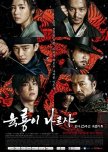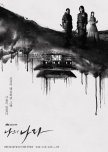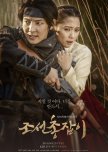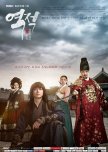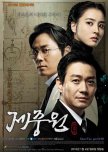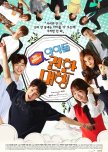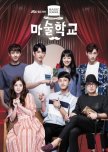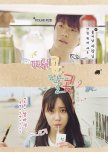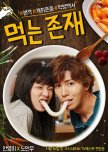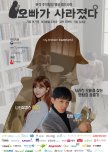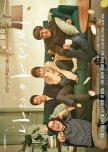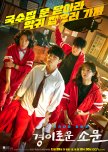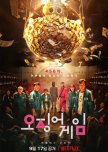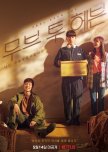 Han Ye Ri confirmed to work with Han Seok Kyu in a new thriller mystery K-drama
Han Ye Ri confirmed to work with Han Seok Kyu in a new thriller mystery K-drama En tant que premier fils d'un riche et important fonctionnaire du gouvernement, Baek Yi Kang aurait dû grandir avec le monde à ses pieds. Malheureusement, ce n'était pas le cas. Fils illégitime de la servante de la femme de son père, Yi Kang a passé toute sa vie à être méprisé par son entourage, simplement parce que sa mère faisait partie d'une classe sociale bien inférieure. Le seul fils légitime de leur père, Baek Yi Hyun n'a connu que le luxe et les privilèges toute sa vie. Après avoir reçu une éducation d'élite au Japon, Yi Hyun est retourné dans la maison de son père pour préparer l'examen national de la fonction publique. Bien qu'ayant des mères différentes, Yi Hyun a toujours bien traité son frère aîné, mais lorsque les rumeurs d'un soulèvement de paysans commencent à se répandre, les relations entre les deux frères deviennent plutôt tendues. Pris entre ces deux frères et la tension grandissante entre eux, se trouve Song Ja In, la fille d'un groupe de colporteurs bien connu et respecté qui rêve de devenir le meilleur marchand de tout Joseon. Ayant son propre rôle à jouer dans le soulèvement imminent, l'implication de Ja In ne fait qu'accroître la tension entre les frères, Yi Kang se rangeant du côté des classes inférieures tandis que Yi Hyun sympathise avec les classes supérieures. La force des liens entre ces frères pourra-t-elle résister aux épreuves à venir ou leurs idéologies différentes finiront-elles par les déchirer ? (Source: Viki) ~~ Inspiré par les événements de la révolution paysanne de Donghak. Modifier la traduction
- Français
- 中文(简体)
- Русский
- English
- Titre original: 녹두꽃
- Aussi connu sous le nom de: Green Bean Flower , Nokdoo Kkot , Nokdu Flower , Nokdu Kkot: Saram , Haneulyi Dweda , Ugeumchi , 우금티 , 녹두꽃 - 사람, 하늘이 되다 , Mung Bean Flower
- Réalisateur: Shin Kyung Soo, Kim Seung Ho
- Scénariste: Jung Hyun Min
- Genres: Historique, Guerre, Politique
Distribution et équipes
- Jo Jung Suk Rôle principal
- Yoon Shi Yoon Rôle principal
- Han Ye Ri Rôle principal
- Choi Moo Sung Rôle principal
- Park Hyuk KwonBaek Ga / Man Deuk [Yi Kang & Yi Hyun's father]Rôle Secondaire
- Min Sung Wook Rôle Secondaire
Critiques
La révolte des paysans qui fit entrer le Japon à Joseon.
J’ai adoré ce drama de bout en bout !! L’histoire, la psychologie des personnages, l’interprétation, la mise en scène et la réalisation, la musique, tout est excellent ! On voit que la production avait du soutien, ils y ont vraiment mis le paquet ! Il y a du monde sur les champs de bataille, la reconstitution est soignée, très crédible ! Si on s’intéresse à la Corée et à son histoire, ce drama est passionnant.La finesse, l’intelligence de l’écriture du scénario, des dialogues, de la conception des personnages est admirable. Pas de manichéisme ici, seulement l’humain, dans toute sa complexité. Pas de personnages héroïques, mais des êtres pleins de contradictions, que les circonstances poussent dans leurs retranchements, qui cherchent leur voie. La peur et le courage, la générosité et la cruauté peuvent alternativement se partager leur cœur. Le père par exemple, qui n’a qu’une idée en tête : faire de son fils un ministre, quels que soient les moyens à utiliser, n’est pas l’être noir et démoniaque qu’on pourrait croire, mais il aime ses fils, sa famille, et si son côté arriviste et matérialiste lui rendent incompréhensible leur évolution, cette incompréhension le rend en quelque sorte touchant ! Le personnage qui m’a le plus frappée, c’est Baek Yi Hyun,( Yoon Si Yoon) qui est au départ un fils de famille au cœur généreux, mais qui, confronté à une situation terrible et injuste va peu à peu s’enfoncer dans une dérive effrayante. Son frère, Baek Yi Kang, (Cho Jeung Seok)véritable brute sans âme au début aux ordres de son père, va suivre le chemin inverse, mais jamais rien ne séparera vraiment les deux frères, leur profonde affection mutuelle triomphera de tout jusqu’à une conclusion inattendue et tragique. Song Ja In, (An Hye Ri), fille du chef des marchands, cherche à faire fructifier l’affaire familiale et à protéger les privilèges de la caste marchande, et elle va naviguer entre cette démarche et son attirance pour Yi Kang, qui va l’entraîner à faire des choix difficiles. Les personnages restent toujours eux-mêmes à travers leur évolution. Il
Il y a une foule de personnages secondaires, mais qui ont tous un rôle important, assurant une construction solide autour des principaux héros de l’histoire.
Au niveau interprétation, elle est parfaite. Cependant un (tout petit)bémol : Yoon Si Yoon m’a paru un peu faible par rapport au rôle écrasant qu’il interprète. Il faudra que je le voie dans autre chose. Les autres sont plus qu’excellents, mention spéciale à Cho Jeung Seok et Choi Moon Sung, le Général… Les dialogues sont percutants, forts, intelligents, non dénués d’humour.
J’ai mis10(masterpiece) t, et je ne crois pas que j’en enlèverai quand je le reverrai, comme parfois ça m’arrive !

Fight for human rights. A story written with the blood of latest Joseon history. Highly valuable.
Definitely worthwile! "Nokdu Flower" offers a historically remarkable epic with a strong performance. The KDrama excels sort of. It almost seems as if the entire team was all too aware of the ambitious challenge to adequately capturing this short but crucial sequence of Korean history.In the second half of the 19th century, exploitation, famine, a corrupt, incompetent government and weak kings had eroded almost all belief in the existing system, in aristocracy and administration. Then there was the opening of the country to world politics and trades, for which the corrupt Joseon also proved to be profitable. In this historical KDrama it's not so much about the political intrigues around the palace, but about the landowners, administrative offices and Yangban in the provinces as well as the rebellion of the desperate rural people, who simply can't take it anymore.
The struggle for democracy in Korean history, like elsewhere in the world, has been quite bloody. That was last in May 1980 in Gwangju, when the democratic aspirations of the people were brutally crushed by the military. This was so during the student independence movement in 1929 in the fight against Japanese oppression. And that happened in connection with the Donghak movement, too, which had caused quite a stir throughout the country between 1860 and 1894. "Nokdu Flower" is deliberately very close to the front lines of those uprisings for democratic reforms, which then had been for the first time organized on this scale. This forms the perfect background for dramatically intertwined relationship dynamics of two half-brothers, (whose father is one of the particularly exploitative provincial officials who bleed the people dry), as well as the daughter of a merchant, who is used to deal with anybody, even the Japanese, for high profit.
The road to democracy on the Korean Peninsula is definitely rocky. To this day, the reactionary forces are still strong. "Nokdu Flower", however, represents a powerful, unforgettable symbol for the spirited struggle for freedom. The Donghak movement is often seen as the first patriotic Korean movement, since it was also about counteracting the increasing e. g. Japanese influence. But more than a patriotic struggle, initially the Donghak movement was actually about an idea that is bigger than family of origin or nation: It's about basic human rights. (An idea that, not too long before that, had also stirred up the European continent)
Matter follows spirit. And this spirit was shaken up in the rural population of Joseon by a new religious movement: Choe Je-u (1824–1864) created a new faith in 1860: Donghak, which roughly means "Eastern Wisdom". Drawing from Confucianism, Buddhism, Taoism and Shamanism, it sees the divine spirit at work in human beings - in ALL human beings, without distinguishing between class or gender. Additionally, it sees the world as moving in cycles - with a whole new world just waiting ahead.
Nevertheless, it is blood that paves the path to a new era. Eventually, the results of the first Donghak peasant rebellion included a treaty. The "Gabo Reform" recognized the new religion, and among other things, the lowest classes were freed, widows were granted the right to remarry, and penalties for corruption and abuse of office were introduced. Unfortunately, there followed a second peasant rebellion...
This is a story written with the blood of latest Joseon history, sort of.
Overall, a highly valuable production.
--------------- BY THE WAY... ----------------------
...the traditional Korean national dish BIBIMBAP is closely linked to Jeonju and to the Donghak uprising. The heart of the rebellion was in Jeolla province with Joenju being the provincial capital. Among farmers who did not have the time to prepare countless side dishes, it was common to simply mix whatever there was with rice and spices. This food proved its worth, especially when it came to feeding the rebels in their brave fight for new values and a more just future.
... the TITLE TRACK is actually a popular folk song that goes straight back to the peasant uprising. "Nokdu Flower" actually means 'blossom of the mung beans', but here it refers to the nickname of Jeon Bong-jun, leader of the peasant rebellion.
"Bird, bird, blue bird,
bird, bird, blue bird,
Don't sit in the mung bean fields.
When the blossom falls
the farmer goes to cry.
Bird, bird, blue bird,
Jeonju Gobu Nokdu bird,
why don't you fly away
The pines and bamboos are green.
We thought it was summer
yet it's bitterly cold and snowy."
The blue bird refers to the Japanese - they shouldn´t have any business in Joseon and should go away. Joenju and Gobu are legendary places of the uprising. Nokdu refers to Jeon Bong-jun´s nickname and the riot. However, Nokdu, the mung bean, also refers to an important agricultural product and food. Falling blossoms indicate a bad harvest. The 'summer' stands for the first uprising, the 'cold winter' for the second. The song was probably born during the execution of the leader Jeon Bong-jun and has since become a nationwide folk song in several different versions.

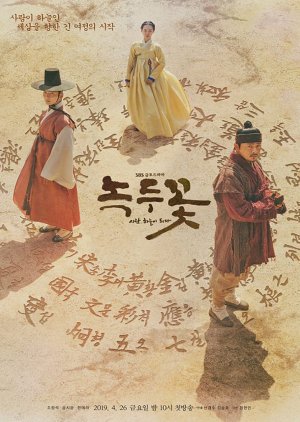






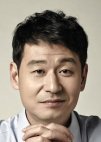

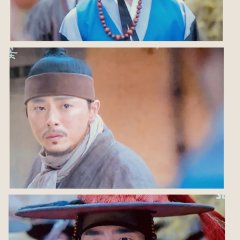
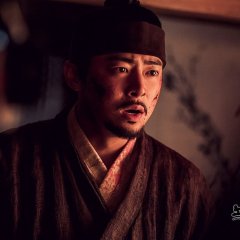

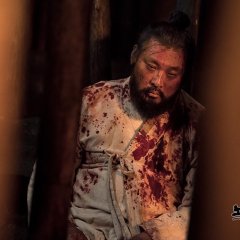
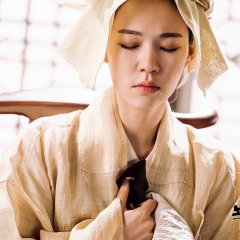
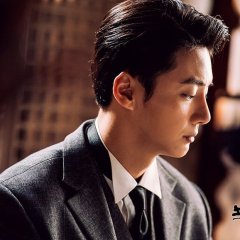
 1
1